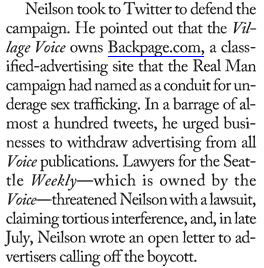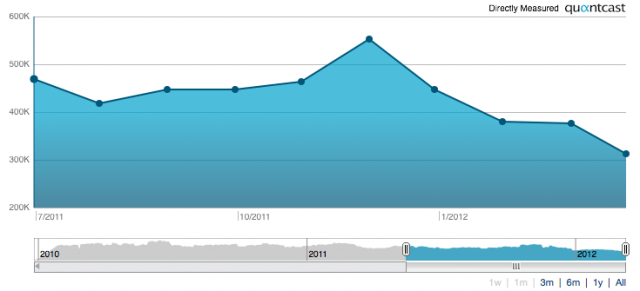
If you haven’t been keeping up on the Backpage.com juvenile prostitution scandal, here is the latest. End of February 2012, Washington’s legislature passed a bill that spells out legal responsibilities for publishers like Backpage.com, if they were found to have provided “adult services” advertising to a minor.
Now, it appears the legislation is among the many bills deprived of Governor Gregoire’s signature, while she wrangles with the legislature over the budget.
UPDATE: Gov. Gregoire has signed the bill into law.
Once signed by the Governor, the new law would allow advertisement publishers to defend themselves from criminal charges, but:
In order to invoke the defense, the defendant must produce for inspection by law enforcement a record of the identification used to verify the age of the person depicted in the advertisement.
Checking a physical ID would seem a low bar, but it’s more difficult to do online, and Backpage.com has been obstreperous in its refusal, claiming that it “has spent millions of dollars and dedicated countless resources to protecting children from those who would misuse an adult site.”After all, the company argues, reaching into its quiver of absurd analogies, “If someone is caught shipping contraband through the Post Office, we do not shut down the U.S. mail.”
Your local purveyor of Backpage.com advertisements is Seattle Weekly, due to its ownership by Village Voice Media, which in turn owns Backpage.com. I was impressed to see that VVM managed to score a helpful counterpoint from the New York Times‘ David Carr, himself a former alt-weekly scrivener.
Carr quotes Washington Attorney General Rob McKenna (and gubernatorial hopeful) saying:
I think we have to be careful to protect the First Amendment rights of publishers, but free speech does not extend to the knowing facilitation of criminal activity. This is not just about children being prostituted, this is about human beings being trafficked into the sex trades, as adults and as children.
Somehow, Carr manages to equate juvenile prostitution with the time “we were under fire for publishing ads for strip clubs, escort services and massage parlors.” He even works in this hoary why-bother: “If Backpage.com retreats — not likely given the predispositions of its owners — some other alternative will immediately take its place.”

Last year, Seattle Weekly ran some eight or nine stories up the flagpole, alternately attacking misleading statistics and moralists, and defending their right to free speech and libertarian profit motive.
The last Weekly-written piece seems to have been in August 2011, but VVM has not given up the fight. PubliCola notes their unsigned editorial claiming that New York Times columnist Nicholas Kristof has gotten his facts wrong, too. Kristof doesn’t think so.
Remember Backpage.com’s “countless resources”? Apparently that is literally true. PubliCola has been trying to verify their claim about the exact number of employees used to screen their adult ads, but so far Backpage.com has been unwilling to provide that information.
I have wondered whether Seattle Weekly‘s stalwart defense of Backpage.com’s “good enough” efforts to prevent juvenile prostitution was a particularly canny public relations move for a free weekly. One hears stories, but when it comes to alt-weeklies, you have to take them with a grain of bitter ex-employee salt. So I decided to turn to Quantcast instead, which directly measures traffic to the online version of Seattle Weekly. There’s no definitive link between the evident slump and their Backpage.com association–traffic goes up and down all the time–but I think it’s fair to say they haven’t benefited much from the ongoing dispute.

